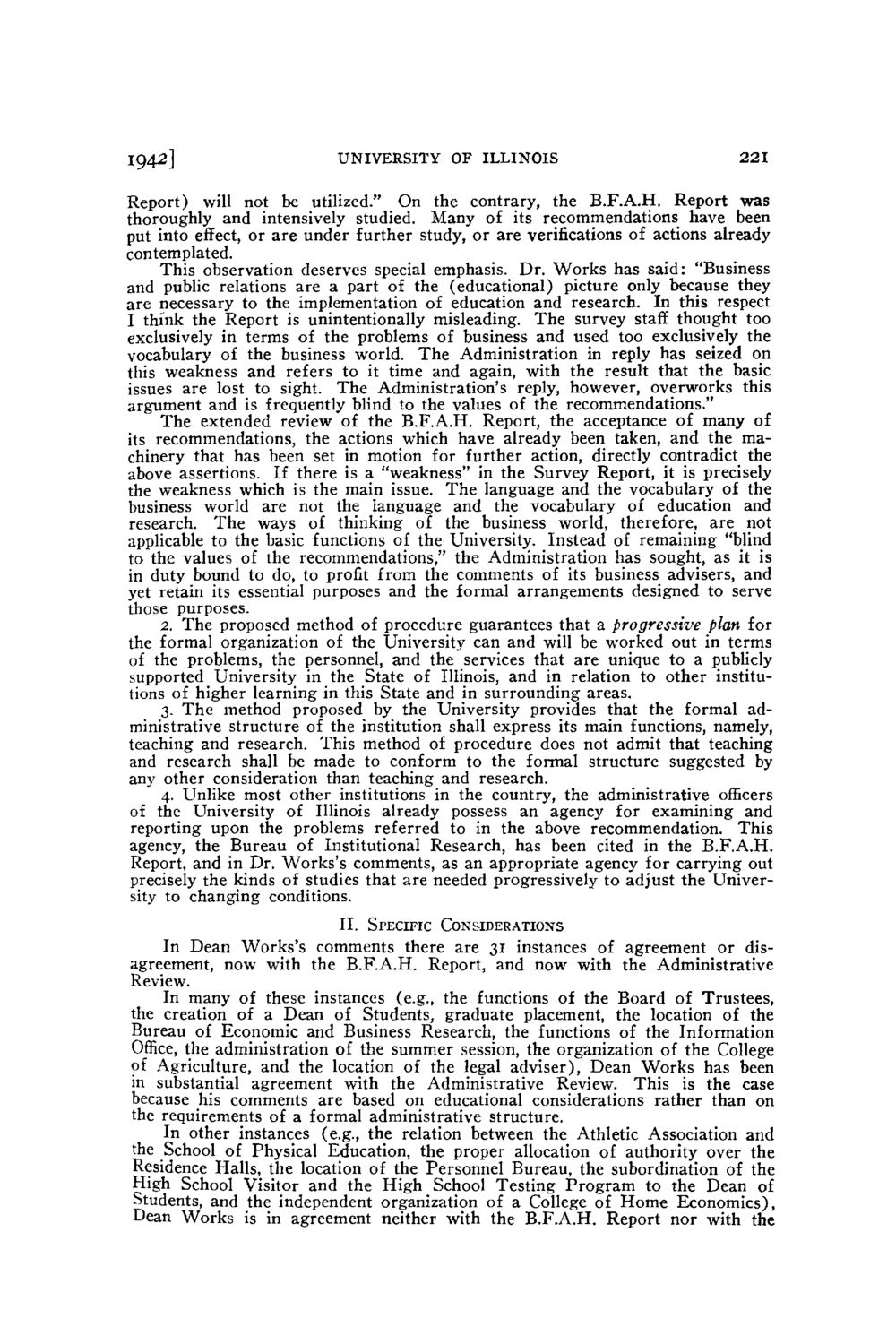| |
| |
Caption: Board of Trustees Minutes - 1944
This is a reduced-resolution page image for fast online browsing.

EXTRACTED TEXT FROM PAGE:
1942] UNIVERSITY OF ILLINOIS 221 Report) will not be utilized." On the contrary, the B.F.A.H. Report was thoroughly and intensively studied. Many of its recommendations have been put into effect, or are under further study, or are verifications of actions already contemplated. This observation deserves special emphasis. Dr. W o r k s has said: "Business and public relations are a part of the (educational) picture only because they are necessary to the implementation of education and research. In this respect I think the Report is unintentionally misleading. T h e survey staff thought too exclusively in terms of the problems of business and used too exclusively the vocabulary of the business world. T h e Administration in reply has seized on this weakness and refers to it time and again, with the result that the basic issues are lost to sight. The Administration's reply, however, overworks this argument and is frequently blind to the values of the recommendations." The extended review of the B.F.A.H. Report, the acceptance of many of its recommendations, the actions which have already been taken, and the machinery that has been set in motion for further action, directly contradict the above assertions. If there is a "weakness" in the Survey Report, it is precisely the weakness which is the main issue. T h e language and the vocabulary of the business world are not the language and the vocabulary of education and research. T h e ways of thinking of the business world, therefore, are not applicable to the basic functions of the University. Instead of remaining "blind to the values of the recommendations," the Administration has sought, as it is in duty bound to do, to profit from the comments of its business advisers, and yet retain its essential purposes and the formal arrangements designed to serve those purposes. 2. The proposed method of procedure guarantees that a progressive plan for the formal organization of the University can and will be worked out in terms of the problems, the personnel, and the services that are unique to a publicly supported University in the State of Illinois, and in relation to other institutions of higher learning in this State and in surrounding areas. 3. T h e method proposed by the University provides that the formal administrative structure of the institution shall express its main functions, namely, teaching and research. This method of procedure does not admit that teaching and research shall be made to conform to the formal structure suggested by any other consideration than teaching and research. 4. Unlike most other institutions in the country, the administrative officers of the University of Illinois already possess an agency for examining and reporting upon the problems referred to in the above recommendation. This agency, the Bureau of Institutional Research, has been cited in the B.F.A.H. Report, and in Dr. Works's comments, as an appropriate agency for carrying out precisely the kinds of studies that are needed progressively to adjust the University to changing conditions. II. SPECIFIC CONSIDERATIONS In Dean Works's comments there are 31 instances of agreement or disagreement, now with the B.F.A.H. Report, and now with the Administrative Review. In many of these instances (e.g., the functions of the Board of Trustees, the creation of a Dean of Students, graduate placement, the location of the Bureau of Economic and Business Research, the functions of the Information Office, the administration of the summer session, the organization of the College of Agriculture, and the location of the legal adviser), Dean W o r k s has been in substantial agreement with the Administrative Review. This is the case because his comments are based on educational considerations rather than on the requirements of a formal administrative structure. In other instances (e.g., the relation between the Athletic Association and the School of Physical Education, the proper allocation of authority over the Residence Halls, the location of the Personnel Bureau, the subordination of the High School Visitor and the High School Testing P r o g r a m to the Dean of Students, and the independent organization of a College of H o m e Economics), Dean Works is in agreement neither with the B.F.A.H. Report nor with the
| |